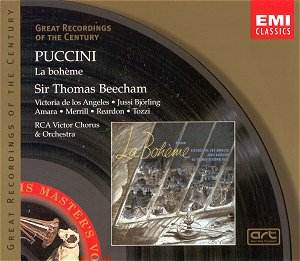Beecham was a Puccini expert, no doubt about that,
with over three hundred performances in theatres to his name. Composer
and conductor knew one another though the relationship was far from
good, with Puccini referring to him as ‘The Purge’, a thinly veiled
observation of Beecham as inheritor of the Pill empire from his father
Joseph. Just look at the cast list which even includes the young Corena
in the minor doubling roles of the landlord Benoit and Musetta’s unfortunate
cuckold Alcindoro. This fabulous recording came as a result of a sudden
realisation by Beecham’s US manager that Jussi Björling, Victoria
de los Angeles and Beecham would be in New York at one and the same
time, in the spring of 1956. The result is an electrifying performance,
recorded in eight days, the orchestral playing quite stunning and the
singing thrilling. Both of the principal soloists were among the finest
exponents in their day of the roles of Rodolfo and Mimi respectively,
while the supporting ensemble has no weak links at all. There were formidable
rival recordings which preceded it in the preceding post-war decade,
such as Tebaldi’s fine Mimi partnered by Hilde Gueden as Musetta, Licia
Albanese’s collaboration in concert in 1946 with Toscanini (whose vocal
involvement proved irritatingly audible, but he did bring an authority
to it for he conducted the premiere in February 1896), then there was
one with Tagliavini, Taddei and Siepi and another with Tucker and Baccaloni,
but the lists are not as uniformly star-studded as Beecham’s. What came
after is another matter, for many would say that Decca’s set with Tebaldi,
Bergonzi, Bastianini, Siepi, Corena, D’Angelo, all under the veteran
Serafin, was the finest ever.
De los Angeles’ first offstage ‘Scusi’ after her shy
tap on the door will seal your enjoyment, bringing tears to the eye
and a shiver to the spine. The ensuing arias by both protagonists, the
one impassioned, the other enchanting, and their climactic duet are
simply outstandingly beautiful, with both at the top of their form.
Act two gets a blazing start from the brass, the chorus sound rather
lame until the women chastise the kids. Apart from the one solo lad
who gets his ears boxed, the boys have no hint of ragazzi about them
and sound as if they are on their way to sing Evensong at King’s College,
Cambridge rather than taunting everyone around them, but Parpignol makes
the most of his offstage cries. Once they are all out of the way we
can settle back to the glorious de los Angeles, who in turn inspires
all the men to sing their hearts out around her café table at
Momus. No offstage hysterics from Musetta at her entry but plenty when
she is seated with the unfortunate Alcindoro at the neighbouring table
to Marcello, and even the chorus gets galvanised into singing as if
they understand what they are singing about. Here, just before her aria,
Beecham indulges in a simply huge combined crescendo and rallentando
(as marked in the score it must be stated) at the orchestral climax
before ‘Ma il tuo cuore martella’ - brazen but effective, even more
so at the aria’s ending when, among the vocal ensemble now in full cry,
he finds so many orchestral strands and subtexts worth bringing out.
You can sense the change of time, season and weather
in the falling snowflakes following the abrupt start to the third act,
the orchestral palette is full of colour, the chinking of distant cups
toasted in the inn by the chorus, beautiful woodwind and harp playing.
Then Mimi, coughing now of course, enters with sympathetic violins making
full use of portamento, her scene with Marcello (sublime singing from
Merrill) packed with tragic ardour and lingering sadness as her fatal
illness is fully revealed. Björling’s entry announcing his intention
to separate from Mimi (who overhears from her hiding place) is full
of tactless immaturity, knowing as he does that she is mortally ill,
while Merrill builds Marcello’s fury like a pressure cooker, trapped
as he is by his vow to Mimi not to reveal her presence. Musetta’s entry
completes the quartet, both pairs of lovers now in a mood a far cry
from the joyous conclusion to the previous act. I defy anyone not to
react to De los Angeles’ sobs, nor to the ensuing parting of the ways
by soprano and remorseful tenor.
Of course there’s even more emotion to come, not least
the glorious duet at the start of the final act for Marcello and Rodolfo,
in which both men’s voices blend exquisitely, with Beecham pacing the
ebb and flow of tempi with secure authority yet immaculate flexibility,
all settling to that magical chord of C major played by strings and
a pair of clarinets, but the genius of Puccini is that the lower one
is the bass clarinet adding a special colour. The horseplay by the four
male friends which follows is exuberant yet one senses that tragedy
is never far off, and sure enough the interruption in the black key
of E minor with Musetta’s announcement that Mimi is with her and seriously
ill produces heartbreaking cries from Rodolfo, and a moving ‘Coat’ aria
from Tozzi as Colline. The deathbed scene is simple, tragic but never
sentimentalised (though it is Björling, rather than de los Angeles,
whose sobs and raw emotion will now gnaw at your heart). If ever you
needed to know exactly when Mimi’s heart stops beating you hear it precisely
here. No, this is not over the top, but a heartfelt and sincere interpretation
by a conductor who, despite his spats with the composer, adored the
music, and for the purposes of this recording had the perfect cast.
Christopher Fifield


